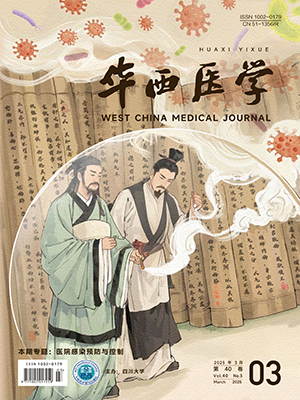| 1. |
江志伟, 李宁, 黎介寿. 快速康复外科的概念及临床意义[J]. 中国实用外科杂志, 2007, 27(2):131-133.
|
| 2. |
Wu SJ, Xiong XZ, Lu J, et al. Fast-Track programs for liver surgery:a Meta-Analysis[J]. J Gastrointest Surg, 2015, 19(9):1640-1652.
|
| 3. |
姜洪池, 孙备, 王刚. 快速康复外科的新理念值得重视[J]. 中华外科杂志, 2007, 45(9):577-579.
|
| 4. |
Bu J, Li N, Huang X, et al. Feasibility of fast-track surgery in elderly patients with gastric cancer[J]. J Gastrointest Surg, 2015, 19(8):1391-1398.
|
| 5. |
Shao Z, Jin G, Ji W, et al. The role of fast-track surgery in pancreaticoduodenectomy:a retrospective cohort study of 635 consecutive resections[J]. Int J Surg, 2015, 15(15):129-133.
|
| 6. |
杨东杰, 蔡世荣, 何裕隆, 等. 快速康复外科在结直肠癌择期手术中的应用效果[J]. 中华普通外科杂志, 2009, 24(6):477-479.
|
| 7. |
江志伟, 黎介寿, 汪志明, 等. 胃癌患者应用加速康复外科治疗的安全性及有效性研究[J]. 中华外科杂志, 2007, 45(19):1314-1317.
|
| 8. |
Wilmore DW, Kehlet H. Managament of patients in fast track surgery[J]. BMJ, 2001, 322(7284):473-476.
|
| 9. |
Zausig YA, Weigand MA, Graf BM. Perioperative fluid management:an analysis of the present situation[J]. Anaesthesist, 2006, 55(4):371-390.
|
| 10. |
Brandstrup B. Fluid therapy for the surgical patient[J]. Best Pract Res Clin Anaesthesiol, 2006, 20(2):265-283.
|
| 11. |
黎介寿. 对Fast-track Surgery(快通道外科)内涵的认识[J]. 中华医学杂志, 2007, 87(8):515-517.
|
| 12. |
Lewis SJ, Egger M, Sylvester PA, et al. Early enteral feeding versus “nil by mouth” after gastrointestinal surgery:systematic review and meta-analysis of controlled trials[J]. BMJ, 2001, 323(7316):773-776.
|
| 13. |
Reismann M, Von Kampen M, Laupichler B, et al. Fast-track surgery in infants and children[J]. J Pediatr Surg, 2007, 42(1):234-238.
|
| 14. |
Bonde C, Khorasani H, Eriksen K, et al. Introducing the fast track surgery principles can reduce length of stay after autologous breast reconstruction using free flaps:a case control study[J]. J Plast Surg Hand Surg, 2015(10):1-5.
|
| 15. |
Kianfar AA, Ahmadi ZH, Mirhossein SM, et al. Ultra fast-track extubation in heart transplant surgery patients[J]. Int J Crit Illn Inj Sci, 2015, 5(2):89-92.
|
| 16. |
Wang JY, Hong X, Chen GH, et al. Clinical application of the fast track surgery model based on preoperative nutritional risk screening in patients with esophageal cancer[J]. Asia Pac J Clin Nutr, 2015, 24(2):206-211.
|
| 17. |
Williamsson C, Karlsson N, Sturesson C, et al. Impact of a fast-track surgery programme for pancreaticoduodenectomy[J]. Br J Surg, 2015, 102(9):1133-1141.
|
| 18. |
Philp S, Carter J, Pather S, et al. Patients’ satisfaction with fast-track surgery in gynaecological oncology[J]. Eur J Cancer Care (Engl), 2015, 24(4):567-573.
|




